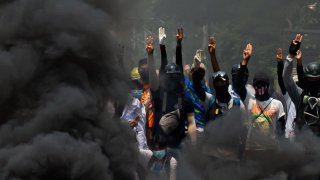
- Myanmar is on the verge of being a "failed state" and there needs to be greater international effort from global powers to bring about stability, according to an expert from a think tank at the Lowy Institute.
- The country saw one of its deadliest day of violence over the weekend, with over 100 people killed and at least seven children killed on Saturday, since the military took control on Feb. 1,.
Myanmar is on the verge of becoming a "failed state" and there needs to be greater international effort from the world's major powers to resolve the escalating crisis, according to an expert from a think tank at the Lowy Institute.
The country saw one of its deadliest day of violence over the weekend, with over 100 people killed on Saturday, including at least six children. It was the highest reported death toll since the military took control on Feb. 1, ousting the elected government of Aung San Suu Kyi.
Feeling out of the loop? We'll catch you up on the Chicago news you need to know. Sign up for the weekly Chicago Catch-Up newsletter here.
"We're getting progressively closer to that point where we can start conceiving of Myanmar as essentially a failed state," Hervé Lemahieu, the director of the power and diplomacy program at the Lowy Institute, told CNBC's "Squawk Box Asia" on Monday.
He said the situation in Myanmar is getting complicated and becoming harder to sustain over time as the military continues to rule "by the power of the gun." As a result, the country is becoming more unstable and "less and less governable by the day," Lemahieu added.
The international community has been swift to condemn the Southeast Asian country following the violence on Saturday. U.S. President Joe Biden on Sunday slammed the bloodshed against the anti-coup protesters in Myanmar as "absolutely outrageous." The European Union described the deadly violence as "unacceptable."
Money Report
It came after the defense chiefs of 12 countries including the U.S., UK, Japan and Australia denounced the Myanmar military, in a rare joint statement.
"As Chiefs of Defense, we condemn the use of lethal force against unarmed people by the Myanmar armed forces and associated security services," said the statement. It added the military must "cease violence and work to restore respect and credibility with the people of Myanmar that it has lost through its actions."
Despite the condemnation of the escalating violence in Myanmar by global powers, the international community is not doing enough to put pressure on the military government, according to Lemahieu.
"What you really need...at the very minimum is for China, India, and the U.S. to agree here... probably also with Japan on perhaps placing pressure on the commander-in-chief Min Aung Hlaing to retire in June, as he was originally scheduled to do. That would be a first sign that perhaps things are moving," he said.
Rodger Baker, senior vice president for strategic analysis from a geopolitical consultancy at Stratfor, also echoed a similar view. He called for greater intervention from the international community to bring about stability in the country.
"I think the big pressure point on the military would end up being economic, but it's not clear that western sanctions alone would be enough to stop that and to cut them off," he said in reference to the military's crackdown on protesters.
"You would have to get China, in particular, to stop economic trade with Myanmar."
He said that could be challenging given China "doesn't want to push its neighboring countries too far," as in the case of North Korea. A breakthrough to resolve the Myanmar crisis soon seems unlikely, he added.
"Right now, it's not clear that the British and the Americans are willing to take physical action," Baker said. "India, clearly wants to maintain some level of contact with the government of Myanmar and try to play the edges here. Unless China makes a major move, it's hard to see that we have a significant breakthrough diplomatically."






